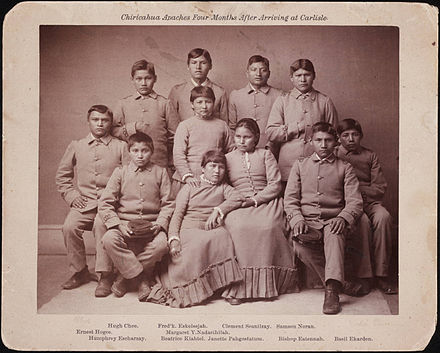OCTOBER 25, 2024 – When driving to the Red Cabin and reaching the point some 40 miles from my destination, I typically tune the radio to WOJB 88.9 FM, the public radio station broadcasting from the heart of the Lac Courte Oreilles Reservation. It’s a quirky little public radio station featuring an eclectic range of music from classic jazz to classic folk-rock to obscure but good . . . and good and old . . . bands. Plus from noon to 1 p.m. on Native America Calling, a syndicated program originating in New Mexico, the listener is treated to a lively discussion of issues affecting members of the various Indian nations of America.
Today, Native America Calling featured the live speech of President Biden before the Gila River Community in Loveen, Arizona. The occasion was public acknowledgment and apology for how the U.S. Government treated generations of indigenous children by ripping them from their homes and families and sending them off to boarding schools designed to assimilate the kids into white culture. The methods were cruel and despicable by modern standards, often resulting in irreparable physical and emotional harm. Close to a thousand children are known to have died in these boarding schools.
As the highest-ranking government representative, President Biden wanted to apologize to all indigenous people for the injustice wrought by the U.S. Government. The first lady had laid much of the groundwork, having visited indigenous nation country 10 times since Joe was elected president. In tone and words, Biden delivered a convincing speech. If he stumbled now and again, as he is wont to do, his empathy and sincerity were unmistakable. The reception and response that he was given were exceptionally gracious, but one must wonder—why did the apology take so long to occur?
The apology was distinguished from mere acknowledgment; from a patronizing, “I know you feel bad.” It was a true apology—no excuses—and heartfelt, and thus it served as a first step in a long-process of emotional and psychological reparation. It’s the sort of thing that needs to be considered on a broader scale—for the internment of American Japanese during WW II and, of course, the enslavement of kidnapped Africans shipped to the New World and the treatment of their progeny for many generations.
President Biden’s apology reminded me of something I learned during intense training for becoming a mediator—back when I thought people might want to hire me to mediate disputes. One part of the training was a mock mediation in which we assumed (and traded) various roles. The case involved a party injured by alleged medical malpractice on the part of a surgeon. In the critique that followed, the instructor told the group that studies had shown by an overwhelming margin that what malpractice claimants sought more than anything else—more than money, even (this being America)—was simply an apology; not an acknowledgment but a sincere apology.
Biden needed no prompting today. He knew what history required was an unqualified apology, and that is exactly what he delivered.
Subscribe to this blog and receive notifications of new posts by email.
© 2024 by Eric Nilsson
